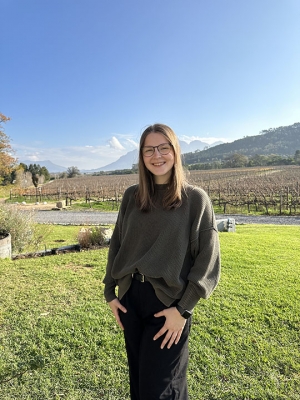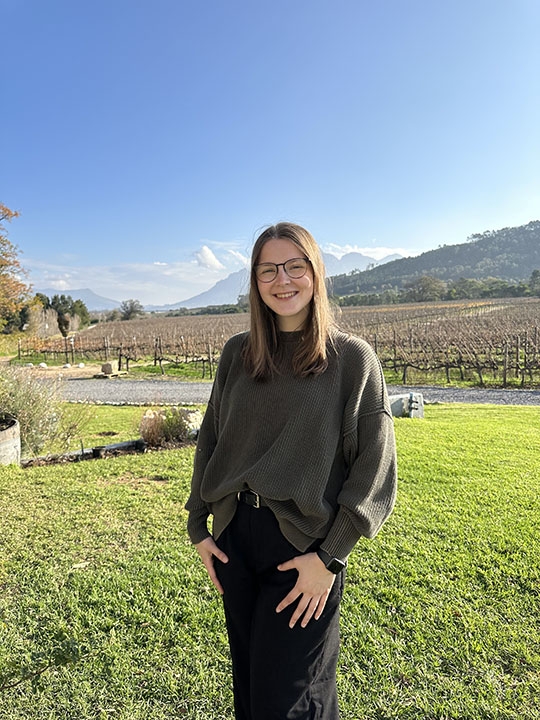By: Kistler Hunt
This past summer, I had the opportunity to study abroad at Stellenbosch University in Stellenbosch, South Africa. From June to July, I engaged in various experiences and conversations, both inside and outside the classroom, that greatly impacted my worldview. I am an Honors College senior studying public health with minors in medical humanities and nutrition and foods. I served as the editor of the Honors Wednesday Memo from January 2022 to December 2024. While abroad, I took classes in South African political history and public health, including a course about HIV/AIDS in South Africa. I received major and University Honors credit for the coursework.
During the application process, I found Stellenbosch University on the list of available programs that fit my degree program and summer schedule. In addition, the experience it offered appeared unique. I had traveled to Europe before, and I was particularly interested in finding a place I hadn’t yet explored.
In addition, the history of South Africa particularly interests me. During grade school, I vividly remember watching videos about Nelson Mandela as an example of leading with character - someone we should strive to emulate. Furthermore, I recall learning about Apartheid quite a few times throughout grade school, but the lessons in my ninth-grade world history class remain prominent. I had a teacher who radiated passion for history in the classroom. While Apartheid was briefly touched on in the context of the curriculum for our class, its lessons remained vivid in my mind. The story of Apartheid seemed different than other global conflicts I had learned up to that point.
The Honors College’s international education requirement asks students to broaden their perspectives as they consider global interconnectedness through exploring other cultures, worldviews, and frames of reference. As students fulfill the requirement, they:
- Apply a holistic approach to global engagement that encompasses intellectual, cultural, and social dimensions as they explore, discover, learn, and grow with others.
- Cultivate cultural competence and humility by examining the importance of understanding, respecting, and valuing difference in building inclusive communities and addressing global challenges collaboratively.
- Reflect on their interactions with individuals and communities from cultural backgrounds different from their own and explain how these cross-cultural experiences have supported their individual personal, academic, and/or professional growth.
The Stellenbosch University program had a high emphasis on experiential learning, which particularly impacted me. Most days, we would spend our mornings in lectures, with our afternoons usually involving an excursion to a relevant site. One of my favorite experiences, one that I will likely remember for the rest of my life, was a trip to Robben Island.
Robben Island is just off the coast of Cape Town, only accessible by ferry. During Apartheid, it served as a prison colony for men who went against the Apartheid regime. Most notably, it was where Nelson Mandela spent the longest part of his 27-year prison sentence. He spent 18 years in solitary confinement on Robben Island. Half of the tour of Robben Island is done by bus, and shows parts of the island that aren’t part of the prison colony. The other half is spent walking around the prison colony, and tour guides are former Robben Island prisoners.
One of the most impactful things I remember from that experience was our tour guide taking our group to the cell he was assigned to during his time on the island. The tour guide briefly described the events leading up to his imprisonment and what it was like to be a prisoner. At that moment, it occurred to me that our tour guide was only a few years older than my mom and that Apartheid wasn’t as long ago as it seemed (Apartheid was declared officially “over” with the first democratic election of Nelson Mandela in 1994, only 30 years ago). I realized that democracy is precious, sacred, and fragile.
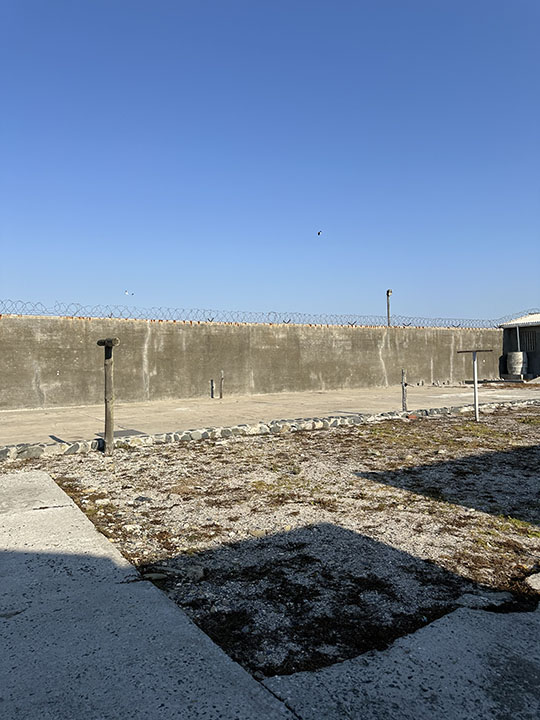
One of the yards used for recreation at Robben Island prison. Prisoners would have limited recreation time, as most of their day was spent working, often in limestone quarries.
In addition, I engaged in experiential learning in my public health courses, which focused on how the public components of its healthcare system support South Africans. The South African healthcare system offers care to all citizens through the government, with varying payment amounts based on income, but there is a paid private option which can lead to quicker treatment times, more room amenities, etc. Our trip to Stellenbosch University’s Biomedical Research Institute (BMRI) in the nearby town of Tygerberg was particularly exciting for me as a public health student. The BMRI holds the classrooms and labs for medical students at Stellenbosch University and it is also a major research hub. Researchers study tuberculosis, HIV, zoonotic diseases, and more in the building. When we toured the building, they showed us the lab where the Omicron, or South African, variant of COVID-19 was genetically sequenced and discovered. As someone interested in epidemiology — the study of disease and disease spread — this was particularly exciting for me. The COVID-19 pandemic was the catalyst that inspired me to study public health, so being able to go to the direct site where groundbreaking public health research occurred felt full circle.
These field experiences also showed me that community health is comparatively well-integrated to the environment in South Africa. We mainly traveled to townships, which are areas that were historically segregated during Apartheid and have remained segregated to this day. Seeing the concept of community health in these townships was amazing; everyone knew each other, supported each other with what they needed, and served an integral role in the health of South Africans. I found it very exciting to witness this in another country.
In my time abroad, I had experiences and came to learn new ideas that I will carry with me for the rest of my life. I went outside of my comfort zone and participated in activities that I never thought I would, including shark cage diving in Gansbaai, which is something I am so grateful to have experienced. When I was little, I remember watching my parents do the same activity in Hawaii, and I wanted to experience it with them - I’ve always had an adventurous spirit! While I wasn’t able to see any sharks, I am grateful for the confidence I gained to go out of my comfort zone. In the same spirit, I also went bungee jumping off the tallest bridge in Africa, the Bloukrans Bridge, which stands a little over 700 feet tall. While I don’t think it’s necessary to get out of your comfort zone by doing extreme sports, traveling and living abroad taught me to be more comfortable with taking risks. I also had other memorable experiences, such as feeding elephants, cave exploring, going to the southernmost tip of the African continent (Cape Agulhas), and a safari!
I returned from this trip much more carefree, in general. I had spent much of my life worrying about what others thought about me and tried to “fit in” the best I could. I am grateful that this experience taught me otherwise. After interacting with people from a diverse array of backgrounds, I learned to appreciate difference, to work with others different from myself, and the value of experiencing different ways of thinking and being.
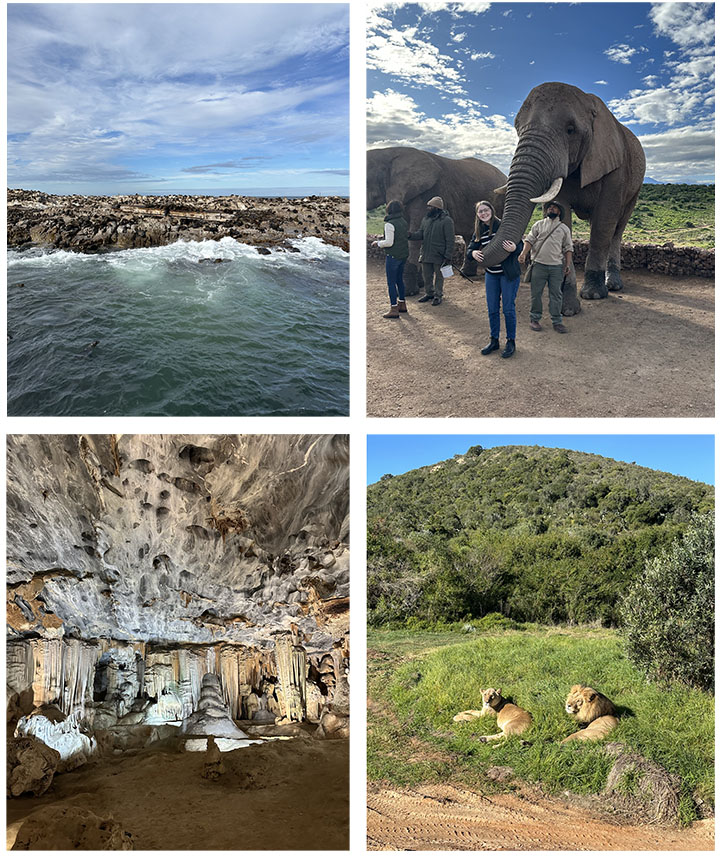
(Clockwise, L to R): A popular seal colony Geyser Island, located in Gansbaai; elephant feeding in Oudtshoorn; Cango Caves, also in Oudtshoorn; lions on a safari (or what they call game drives).
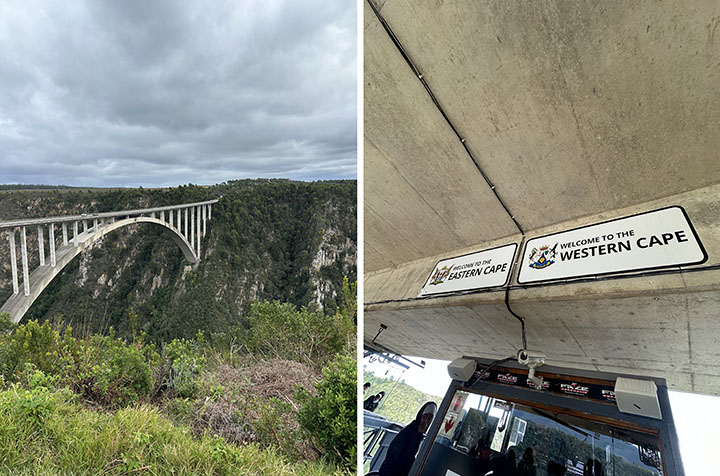
The Bloukrans Bridge stretches across two South African provinces, the Western Cape and Eastern Cape provinces.
This trip, in some way, served as a bookend to my undergraduate academic career. Throughout my time at App State, I had been learning in classrooms, with little academic engagement outside of the App State community. However, interacting with an entirely different community and country allowed me to understand all of my academic learning in broad, real-world-application. I am now better prepared to live and lead as a citizen who is engaged, aware, and passionate about making a difference.
I wholeheartedly recommend studying abroad to anyone who is able. I encourage you to seek opportunities that will meet your personal, professional, and intellectual goals and circumstances. The Office of International Programs provides wonderful resources throughout the study abroad and application process — their assistance is invaluable. Maintain consistent communication with your Honors mentor, as they can help connect you with the perfect international education experience for you given your goals and priorities.
Top photo features me in Franschhoek, South Africa. All photos submitted by Kistler Hunt.
